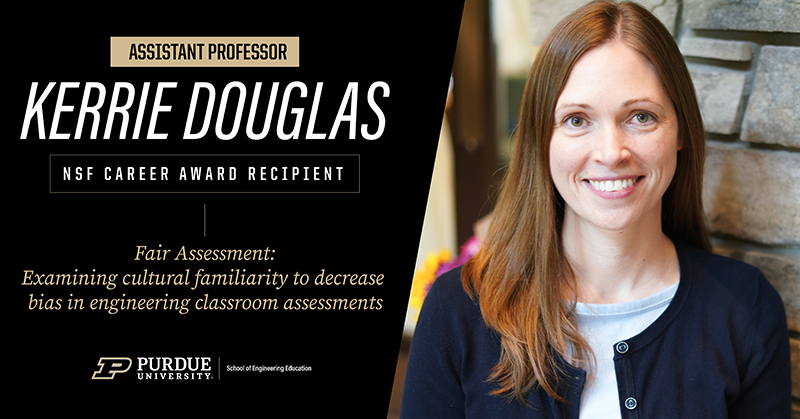Prof. Kerrie Douglas receives NSF CAREER award
| Event Date: | February 9, 2021 |
|---|
Prof. Douglas’ CAREER project will inform the field of engineering education by identifying how engineering education instructors and researchers can increase the fairness of assessments. Through its integrated research and education plans, the work will improve decision-making in engineering education and achievement for students of Color.
"There are consistent disparities in achievement on test scores between undergraduate engineering students of Color and their White peers, particularly at primarily White institutions. The most common explanations for the score differences attribute blame to either the students’ previous education or their lack of preparation. Yet, test questions contain contexts and language that can be interpreted differently based on one’s lived experience and culture. The purpose of this research is to examine the technical qualities of test questions that can disadvantage students of Color and to develop a framework for creating more equitable engineering exams."

Because there are so few students of Color in engineering, traditional approaches to studying assessment bias cannot be used. This project will use an explanatory sequential mixed-methods approach which integrates studies of item difficulty and discrimination for each group of students separately and then will conduct interviews to explain the quantitative findings and build theory. The new approaches and methods developed will lead to significant strides in solving the problem of unfair assessment in engineering education.
The research questions will investigate:
- To what extent do items in these three assessments demonstrate adequate functioning for students of Color?
- To what extent do score discrepancies remain once inadequate items are removed?
- What are patterns of cultural familiarity and content of problematic items and items that show acceptable functioning?
- How do students of Color experience testing in concept inventories?
In the education plan, findings will be applied to develop and disseminate educational materials for three primary groups of learners: (1) future engineering faculty, (2) current engineering faculty, and (3) minority- and women-in-engineering program staff. The findings will benefit society directly from the research outcomes, activities related to conducting the research in this project, and educational activities.
The first research question provides important information concerning the extent to which unfairness in assessments contributes to disparities in achievement. The second and third research questions lead to principles for fair assessments that will be widely shared with engineering instructors and future faculty (via a graduate course and partnerships with national engineering education organizations); these will improve fairness for thousands of students across the country.
